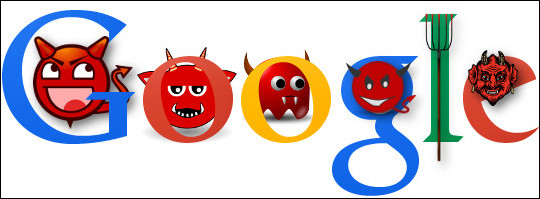| Previous
Page |
PCLinuxOS
Magazine |
PCLinuxOS |
Article List |
Disclaimer |
Next Page |
"Do No Evil": Has Google Lost Its Way? |
|
by Paul Arnote (parnote) Google. You either love them, or you love to hate them. For many modern internet consumers, it's a little of both. Without a doubt, Google has earned every ounce of love and hate that comes their way. There's love for many of their services, and there is vicious hatred that is rooted in their business practices and with whom they've chosen to hop into bed, so to speak. For some internet consumers, their hatred is so strong that they refuse to use any Google services, or services that rely on Google to provide their "backbone." I was reminded of how mixed the emotions/feeling are towards Google when I stumbled across an old article from 2011 about the U.S. government's investigation of Google for antitrust activities. That article led me to the prospectus that Google had filed with the SEC (the U.S. Securities Exchange Commission) prior to the IPO (initial public offering) of their stock, when Google became a publicly traded company in 2004. It was, certainly, interesting reading (especially since I had never read it before).  To gain a better understanding, we first have to look back at the founding of Google. If you're interested, you can find a blow-by-blow, in-depth accounting here (there are omissions, however, such as the "failed" Google Wave). But, in a nutshell, Larry Page (current CEO and cofounder) and Sergey Brin (co-founder and current director of special projects) met at Stanford University in 1995, and started Google in September 1998 (the domain name was registered in 1997). They start out Google in a garage in Menlo Park, California. By December, PC Magazine recognized Google as the "search engine of choice," and in the top 100 websites in 1998. Google Adwords launched in 2000, providing Google's primary source of cash flow.  Page and Brin in their first "headquarters," a garage in Menlo Park. In December 2000, Google Toolbar (a browser plugin) was released. Current Executive Chairman Eric Schmidt joined the company in 2001 as CEO, and Google Images (a search engine for images) was started. They also went "international" in 2001, opening their first "international" office in Tokyo, Japan. 2002 saw the launch of Google Labs, Google News and Google Shopping (originally called Froogle until its name was changed in 2012). In 2003, they acquired Blogger, and launched Google Adsense, Google Grants, Google Code Jam, and Google Print (since renamed to Google Books). In 2004, they launched Orkut, Gmail, and acquire Picasa -- all before their IPO in August 2004. So, by the time of Google's IPO, they already had a lot of steam in their boilers, so to speak, and they were experiencing phenomenal growth. They initially offered 19,605,052 shares of Class A common stock for sale on Wall Street, with an opening price of $85 per share. Since then, Google has introduced many other services, such as Google Maps, Google Scholar, Google+, the Chrome web browser, the Chrome OS ... and the list goes on and on and on.  Google's first server stack, 1998. Here are a few infamous, albeit naive, excerpts from that prospectus: On serving end users:
On long term focus:
The "Don't Be Evil" clause:
Losing the shroud of innocence Up until Google's emergence as the powerhouse of the internet age, the most frequently vilified entity was Microsoft. The folks in Redmond, Washington must be somewhat happy to have someone else take some of the heat off of them in the villain department. It's only natural to take pot shots at the "big guy" at the top, the one who's calling the shots, especially when those below them feel that they have no say in things. Suspicions about Google's activities really got started when they began scanning Gmail users' email to target "relevant" ads to Gmail users. Google claimed (claims) that the mail isn't actually "read." Rather, they claim, the emails are "scanned" for keywords to indicate interests of the user so ads can be offered up with greater relevance. Still, many users cried "foul!" Despite Google's assertions, many users wondered if Google was collecting this information from their emails, what parts of it were they saving?  An image in one of Google's top secret data centers and network (photo from Google Careers). Next, came problems with Google automatically opting in users to various services. Instead, Google said users not interested in these various services could opt out. Users argued that users interested should be the ones to opt in, instead of forcing users to opt out if they lacked interest in the new services. This seems to be a problem that continues today, albeit to a lesser extent. Then, there has been the problem of Google discontinuing services not long after introducing them. They would attract all these users, and then pull the plug. One prime example was Google Wave, where Google tried to reimagine email, using 21st century thinking and technology. Google pulled the plug on it barely 18 months after its launch. Another discontinued service was Google's Linux search page. Never mind that Google uses Linux to run its servers. Never mind that the computers/workstations in Google's headquarters ONLY run Linux (Windows is not allowed). Many Linux users lament the fact that Google makes most -- if not all -- of its money off of the back of Linux, but refuses to give anything back to the Linux community. When Google Drive was introduced, Google promised a Linux desktop client for Drive within six months after the launch of Google Drive. Here it is, well over three years later, and there is still no Linux desktop client available -- at least publicly. There are many reports of an "in house" Linux desktop client that Google uses at their offices on their homegrown custom version of Linux (and most of the reports sing praises on how well it works), but they have not released anything to the Linux community. Instead, the Linux community is forced to rely on workarounds and kludge solutions in the absence of an "official" client. Similarly, if you were a Linux user and a user of Google Picasa, there was little to no "love" flowing from Google to Linux users. For a while, Google distributed the Windows version of the Picasa client, bundled with Wine, for Linux users to use. But then, they discontinued even that kludge. Once again, Linux users are/were forced to use homegrown solutions to find a Linux desktop solution (something Linux users have done and grown accustomed to doing over the years). Linux applications like Shotwell and others allow users to upload their image collections to Picasa. However, the only sure way to view all of your Picasa albums is via Picasa's web interface in your web browser.  A rare look inside one of Google's data centers and network (photo by Google Careers). Then, there is the matter of Google sharing user information and communications with governments spying on their citizens. Whether the sharing of data is coerced by the governments or not is something that hasn't been fully determined. But, I find it hard to believe that you would not notice a data pipe running from your servers to NSA servers. Somewhere along the way, someone will certainly take notice. Such activities don't occur without extra equipment (and someone hooking it all up), nor without causing a negative hit to your throughput speeds, and not without causing a CPU/memory hit on the servers. The tales of abandonment and improprieties go on and on and on, seemingly without an end in sight. They could probably fill a bestselling book, especially when tied to stories from inside 1600 Amphitheatre Pkwy., Mountain View, CA. Summary I understand that Google is a business. I understand that their primary income stream is from selling smallish, minimally intrusive text-based ads. I do not lament their desire to tweak and tune their business to maximize their income stream. What I -- and other users -- do dislike is how they sometimes go about that pursuit of income. Making users opt out of new services is wrong. Pulling the plug on new services before they've even had the chance to take root is wrong. Not supporting the community that makes the OS that makes your business possible is wrong. Being a participant in illegal spying by governments on their citizens is wrong. Will I still continue to use Google's robust and helpful services? I'm certain that I will. But, at the same time, I find myself exercising a bit more discretion about the information I share via Google's services, and I'm becoming more and more discriminating by the day. There are other users -- some of our friends and family in the PCLinuxOS forums, even -- who have sworn off from using Google services altogether. Given the events in the past 11 years since the Google IPO and in the 20 years since the first meeting of Larry Page and Sergey Brin, I can only draw one conclusion: "Do No Evil" had a different meaning in 1995 than it has today. |



